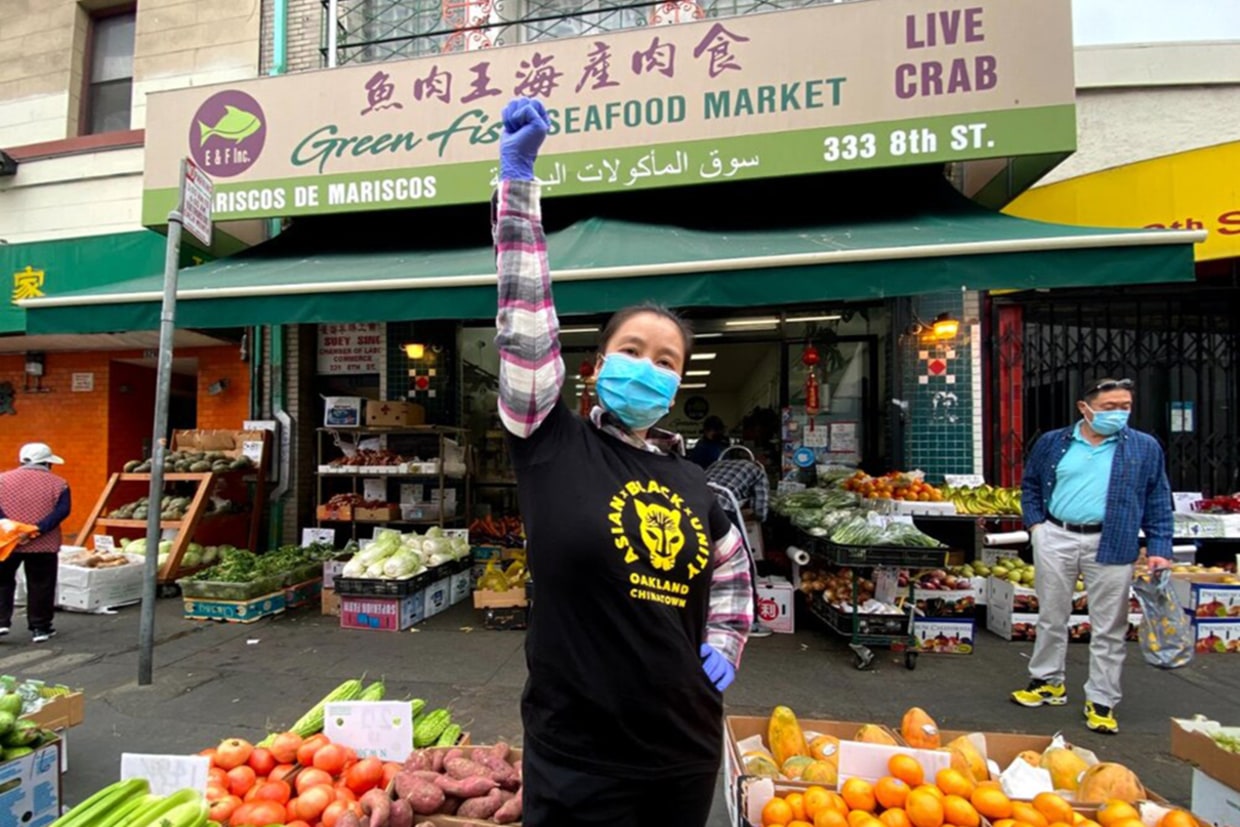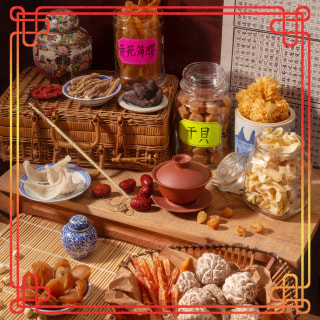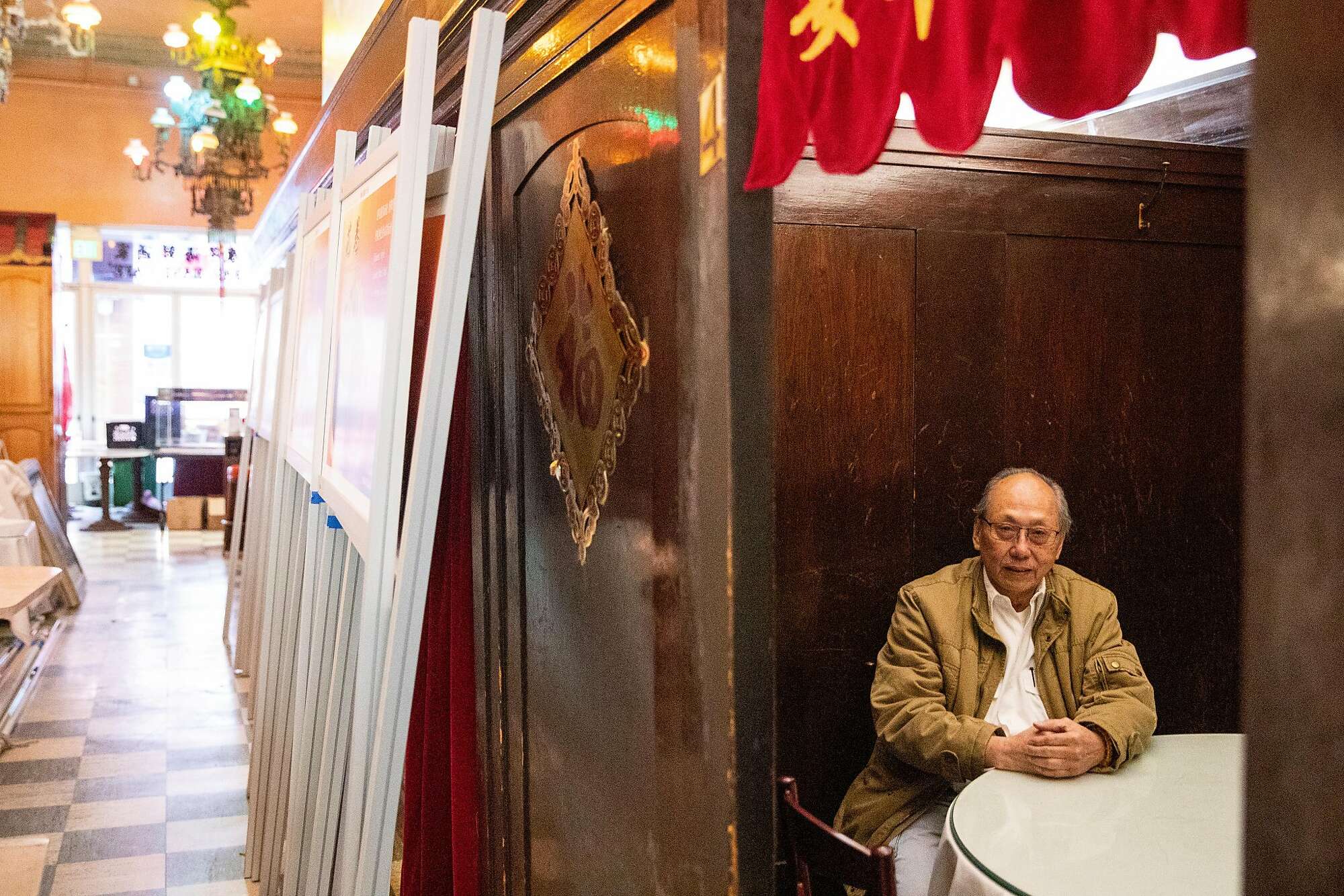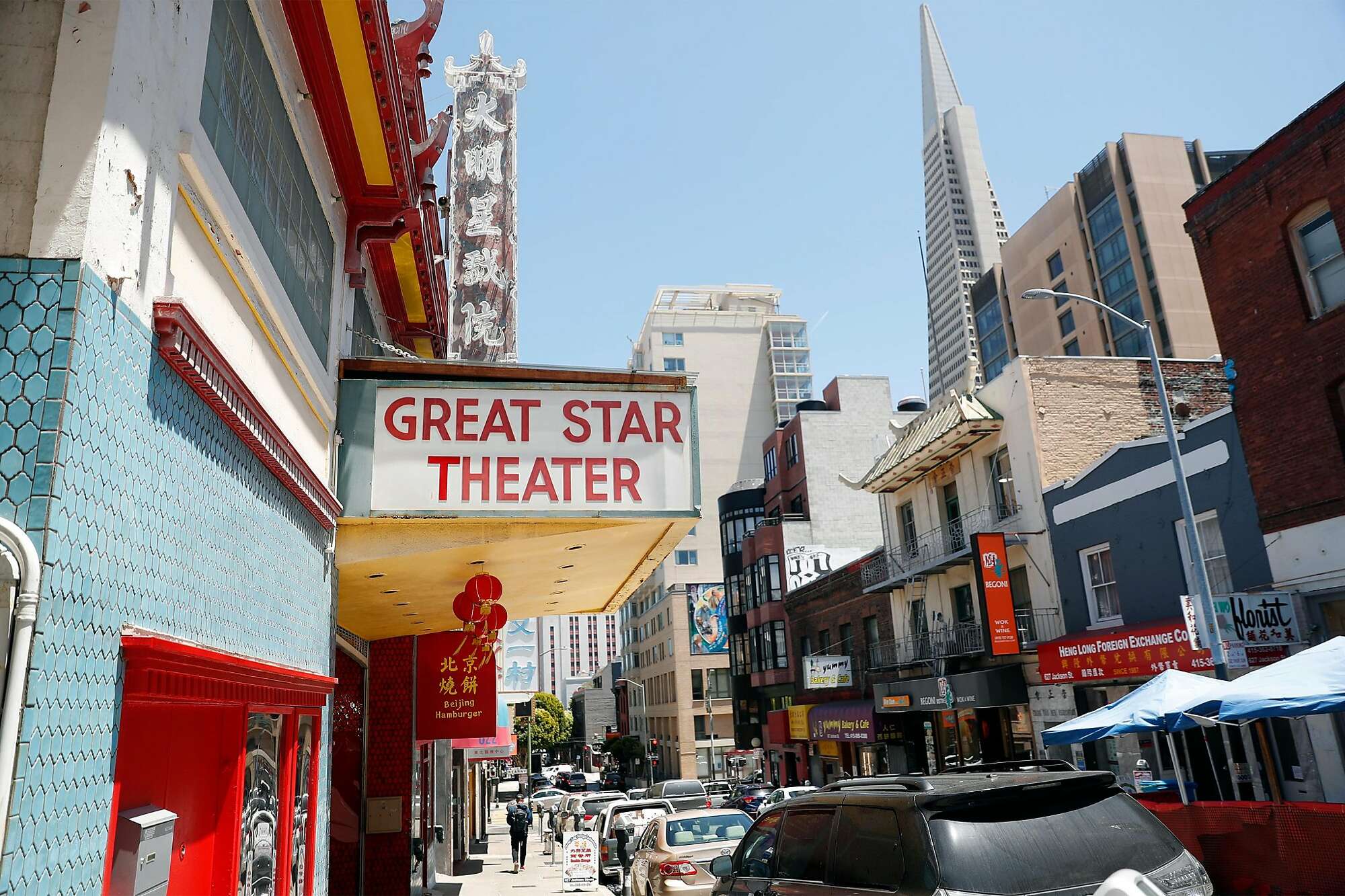
Clockwise from top left: Gogo Wu and Lillian Lin at the Chinese Real Estate Association of America Chinese New Year and Installation Banquet held at New Asia restaurant on February 21, 2020; Kuo Wah restaurant in San Francisco’s Chinatown in an undated photo; a Lunar New Year banquet held by the Chinatown Community Development Center (CCDC) that was attended by, from far right, future Vice President Kamala Harris, the Rev. Norman Fong of the CCDC, Jane Kim, David Chiu, Phil Ting, the late Jeff Adachi, the late Mayor Ed Lee, the late Rose Pak and CCDC founder Gordon Chin; an image from an old postcard showing the interior of the Empress of China, a banquet hall in San Francisco’s Chinatown. | Photos By Frank Jang And Chinatown Community Development Center
HUNDREDS OF BANQUETS take place in San Francisco Chinatown every year — family association gatherings, weddings, red egg and ginger parties, political fundraisers and galas for nonprofits. More modest events might book a smaller banquet hall like Imperial Palace. But the big ones can fill up all 680 seats at Far East Cafe or the 1,000 at New Asia. (Back in the day, some banquets were so large that they filled multiple locations.) A Chinatown banquet, much like Chinatown itself, is a crowded affair, with guests seated snugly at 10-tops as waiters in white shirts and vests deploy platters upon platters across the dining room. The dishes are abundant; there is always food left over.
The first quarter of the year is an especially busy time because of Chinese New Year, which typically occurs in late January or early February. Because there aren’t enough bookings available close to the holiday to accommodate everyone, New Year banquets can stretch into April and May. Reservations need to be made a year in advance, sometimes two.
A Chinatown banquet is not just a party with a parade of family-style dishes. For a community that has endured segregation, racist immigration exclusion that kept families apart and threats of displacement, banquets are loud, bountiful, collective affirmations of community resilience.
“This is a community that traditionally has been very close, very networked, and very organized in certain senses and I think that that connection has been one of the critical elements of why this community has been a successful immigrant gateway for so long,” says Malcolm Yeung, executive director of the Chinatown Community Development Center, one of the organizations that penned the letter to the city asking for help.
Forced to fend for itself, Chinatown long ago established an ecosystem of mutual aid through its family and district associations and its social service and advocacy organizations — a network that still exists today. New immigrants know they can come to Chinatown for resources and opportunities. “All of that is based on the connection and cultural fabric that we’ve been able to weave in this community,” Yeung said. And community banquets are the primary mechanism for celebrating and maintaining those connections, he says.
And while food is always important — each dish in a banquet is imbued with meaning — it’s not about the meal, but the whole experience of Chinatown. About being reminded, even if on a subconscious level, that this is where the community began.
Chinatown banquets also showcase political empowerment. Laurene Wu McClain, 77, an attorney who grew up in Chinatown, attended banquets in the 1950s and ’60s with her father, the head of their family association and a co-founder of San Francisco’s Chinese Historical Society. She remembers fondly the sound of hundreds of people cracking open watermelon seeds with their teeth at the start of banquets, and the bottles of Belfast Sparkling Cider on every table.
She also remembers how, against the backdrop of the Cold War, when relations between the U.S. and a newly communist China were antagonistic, the community courted politicians and government officials. Though most Chinese Americans were anti-communist, they feared they’d be viewed as the enemy and incarcerated, as Japanese Americans had been during World War II. They made outreach efforts to the wider American society through events like the Chinese New Year Parade and banquets.
“Sometimes it was the first time anyone would have seen the Caucasian mayor of San Francisco or seen in person one of the members of the Board of Supervisors,” she says of guests at banquets. “That was part of the assimilation process, that, yes, we are our own ethnic group, but we do belong here. We belong here and we invite you to join us in our celebrations.”
Today, many working-class families who started out in Chinatown have advanced to the middle class and live in the avenues or suburbs of the East Bay and Peninsula where there are newer, more spacious Chinese restaurants and 99 Ranch Markets with well-stocked aisles and hot deli counters. There’s less reason to come to Chinatown and hassle with parking just to buy groceries and a roast duck. Younger generations often prefer getting married in Napa rather than throwing a traditional Chinese wedding banquet.
Yet banquets remain critical to the culture and plexus of Chinatown, connecting community members to the power brokers of the city — and to each other.
“Chinatown is the social-political capital of the Chinese community,” says David Ho, 43, a political consultant. “People don’t go book tables in Cupertino and expect 1,000 Chinese to show up. That’s just not going to happen. First, they don’t have the facilities for it. Second, only Chinatown can get that kind of audience and attention from politicians.”
Ho would know. As a Chinatown activist and a political consultant, he has thrown his share of banquets over the years.
“It’s really about community coming together. It’s about seeing old friends and new friends, and a tie to where we came from, to the immigrant legacy,” says Mabel Teng, a community advocate and former San Francisco supervisor. “Some of us crossed the ocean five decades ago, but some crossed the Pacific five years ago, and we are a community of intergenerational legacy, and also intergenerational leadership.”
After the pandemic ended banquets at the New Asia restaurant in S.F.’s Chinatown, its owner converted it into a neighborhood grocery store. | Jessica Christian / The Chronicle
NEW ASIA RESTAURANT, established in 1987 at 772 Pacific Ave., is a newcomer compared to Far East Cafe, and looks it with its high ceiling, shiny gold pillars and multicolor strip lights. A pushcart-style dim sum parlor by day, it is Chinatown’s largest banquet hall. When banquets began being canceled over coronavirus concerns in January 2020, Hon So, the owner since 2000, grew so anxious he couldn’t sleep.
So, 61, canceled any supply orders he could and stored what had already arrived in freezers. It would just be for a few months, he thought. In July, though, he had to throw it all out, trashing cases of shrimp, beef, chicken, an estimated $100,000 worth of food. Insurance would not cover the loss.
“When I was throwing things out, I was thinking, what will I do in the immediate future? What do I do with a big place like this?” So says in Cantonese. “You have no income, but you still have your bills. The income is not just for me, but for my family, my workers. What can I do to yield income for everyone?”
He thought about how in this new reality of the pandemic, people were lining up to buy groceries and cook at home.
Over two weeks in July, with the help of friends, he cleared tables to make way for shelving and freezers. The next month, New Asia reopened as a grocery store, which allowed So to retain 10 to 15 jobs, a fraction of the 40- to 50-member staff he had before. New Asia’s proximity to Stockton Street, where many neighborhood markets are located, helped bring in foot traffic.
On a recent Saturday, shoppers browsed the selection of produce, snacks and frozen foods. On the stage, two steps up from the dance floor, packages of toilet paper and rice noodles were stacked on repurposed dining tables. The character for double happiness, a symbol of marriage, was on the wall above them.
“This is the only market with crystal lights,” So said wryly, referring to New Asia’s chandeliers.




 Reply With Quote
Reply With Quote










:format(webp)/cdn.vox-cdn.com/uploads/chorus_image/image/69264408/20210114_Empress_218_Edit.0.jpg)







